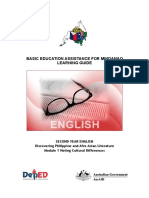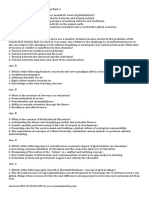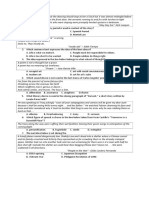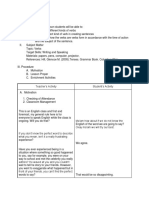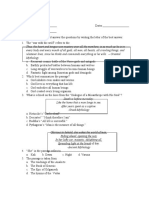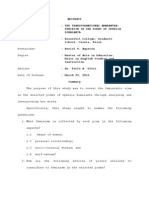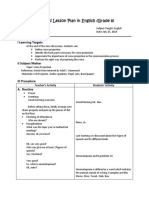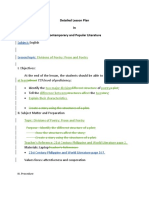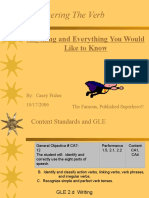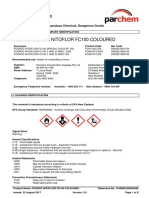Answer Key ESP
Answer Key ESP
Uploaded by
MusesSMLCopyright:
Available Formats
Answer Key ESP
Answer Key ESP
Uploaded by
MusesSMLOriginal Description:
Copyright
Available Formats
Share this document
Did you find this document useful?
Is this content inappropriate?
Copyright:
Available Formats
Answer Key ESP
Answer Key ESP
Uploaded by
MusesSMLCopyright:
Available Formats
PNU LET Review 2009 English for Specific Purposes
ANSWER KEY
Part I: Sample Test Items
1. Kill Me Softly, a recruitment agency that sends butchers to Australia wants to
enhance the English oral communication proficiency of their prospective employees
Which syllabus would be the most appropriate to develop?
A. Skills-based syllabus
B. Method-based syllabus
C. Content-based syllabus
D. Knowledge-based syllabus
The answer is A, because the particular need of the client is to develop the oral
communication competencies. Remember that Method-based syllabus focuses on the
learning preferences or styles of students, while Content-based syllabus may focus on
language form, language notion, language function, situation, or even topic. There is no such
thing as Knowledge-based syllabus, or if there is, its not ESP.
2. Which among the following objectives is NOT appropriate/ aligned with the material
below?
A. Present a report using graphs as supplementary materials.
B. Summarize the information presented through graphs.
C. Identify the essential components of graphs.
The answer is D, because grammar is the least among the priorities in this particular ESP
class. Objectives A, B, C would be very helpful since these objectives cover competencies
such as understanding non-verbal texts, presenting data and information through graphs,
and the likes.
D. Appropriately use verb tenses in graphs.
3. Everything in ESP starts with
A. Evaluation
B. Needs assessment
C. Materials Development
D. Organization of lessons
The answer is B. Remember that there will be no ESP without a proper assessment and
analysis of the students needs.
Part II: Analyzing Test Items
Prepared by: Page 1 of 11
Aracelli Amarles Ver. 1 (4-6-2009)
Matthew M. Nepomuceno
PNU LET Review 2009 English for Specific Purposes
ANSWER KEY
1. When designing an ESP program, all of the following needs should be considered,
except
A. communicative skills required in the workplace
B. weaknesses or lacks
C. learning theories
D. learning styles
2. All of the following stages are necessary in ESP course designing, except
A. Evaluation
B. Needs Assessment
C. Determining Goals & Objectives
D. Identifying philosophical underpinnings
3. Which among the following is an example of an ESP needs analysis?
A. Psychoanalysis
B. Structural Analysis
C. Material-based Analysis
D. Target situation Analysis
4. Which among the following objectives is NOT appropriate/ aligned with the material
below?
A. Identify
the
essential
components of graphs.
B. Appropriately use subject-verb agreement in graphs.
C. Summarize the information presented through graphs.
D. Present a report using graphs as supplementary materials.
5. All of the following class activities are recommended for a Business English course,
except
A. Writing reaction papers
B. Writing business reports
C. Presenting a business plan
D. Conducting a feasibility study
6. The Technical Skills Development Authority (TESDA) collaborated with PNU to train
the English Proficiency of Baristas who will be employed in Starbucks Coffee Company
in California. Which syllabus would be the most appropriate to develop?
Prepared by: Page 2 of 11
Aracelli Amarles Ver. 1 (4-6-2009)
Matthew M. Nepomuceno
PNU LET Review 2009 English for Specific Purposes
ANSWER KEY
A. Skills-based syllabus
B. Method-based syllabus
C. Content-based syllabus
D. Knowledge-based syllabus
7. A group of Korean nationals came to the Philippines to enhance their Basic
Interpersonal Communication Skills in English. What type of syllabus would be the most
appropriate in this situation?
A. Skills-based syllabus
B. Method-based syllabus
C. Content-based syllabus
D. Knowledge-based syllabus
8. Mr. Reyes handles a proficiency-enhancement program for Criminology students. At
the onset of the program, he conducted a needs assessment to identify their current
level of proficiency. Mr. Reyes focused on what type of needs analysis?
A. Target situation analysis
B. Present situation analysis
C. Pedagogic needs analysis
D. Competency-based analysis
9. Before designing the English for Flight Attendants Syllabus, Mr. Cruz made a study on
the most frequent and necessary terms that Flight Attendants use. What type of analysis
did Mr. Cruz conduct?
A. Pedagogic needs analysis
B. Target situation analysis
C. Discourse Analysis
D. Register Analysis
10. In the English for Tourist Guides class, Mr. Ramirez distributed a hand-out containing
a script that students will use during their practicum. What principle of ESP
methodology does Mr. Ramirez violate?
A. Discipline Specific
B. Student centered
C. Error Tolerance
D. Authenticity
11. The following constitute ESP courses EXCEPT
A. A course that teaches undergraduate engineering students from various
branches to write reports on design projects
B. A course design to prepare students for the Test of English as a Foreign
language (TOEFL)
C. A course designed to teach social English to a group of business people
D. A course team-taught with a subject-lecturer, that helps post graduates of a
particular discipline understand departmental lectures
12. Which category of ESP does English for Teachers belong?
A. English for Occupational Purposes (EOP)
B. English for Academic purposes (EAP)
C. English for Vocational Purposes (EVP)
D. English for Business Purposes (EBP)
Questions 13-15: Read and analyze the following sample lesson in an ESP class:
Prepared by: Page 3 of 11
Aracelli Amarles Ver. 1 (4-6-2009)
Matthew M. Nepomuceno
PNU LET Review 2009 English for Specific Purposes
ANSWER KEY
Stages in the Life Cycle of a Plant
Look at these examples:
Preceding actions:
Before the plant germinates, it is watered
Before
Prior to germination, the seed is watered
Following Actions:
After the plant germinates, the roots and leaves develop.
After germination, the roots and leaves develop.
Simultaneous Actions:
As the plant germinates, the seed swells.
During germination, the seed swells.
After the seed is watered, germination
occurs.
Now, answer the following questions: takes place.
A) What happens prior to germination?
B) What occurs during growth?
C) What happens before flowering?
13. In the ESP lesson above, what is the real content of the material?
A. Life cycle of plant
B. Expressions of time sequence
C. Comprehension questions
D. Germination
14. What is the carrier content of the sample lesson?
A. Germination
B. Expressions of time sequence
C. Life cycle of a plant
D. Comprehension questions
15. When an ESP teacher chooses suitable published material, adapts material or even
writes material where nothing suitable exists, the teacher plays as
A. Course designer
B. Researcher
C. Collaborator
D. Evaluator
16. For practitioners of English for Business Purposes, acquiring knowledge and
understanding in the following areas is necessary EXCEPT
A. An understanding of the business peoples expectations and learning
strategies
B. Some knowledge of management theories and practice
C. A knowledge of the communicative functioning of English in business
contexts
D. First class training for business people
17. Ms. Cruz, an ESP practitioner, decides to use a table of statistics to teach the
language of comparison. Which constitute the carrier content of the lesson?
Prepared by: Page 4 of 11
Aracelli Amarles Ver. 1 (4-6-2009)
Matthew M. Nepomuceno
PNU LET Review 2009 English for Specific Purposes
ANSWER KEY
A. Language comparison
B. Statistics
C. Method used by the teacher
D. Choice of materials to fit the needs of the learners
18. Mr. Santos conducts tests to assess whether students have the requisite language
and skills to undertake a particular academic course or career, and level of their
achievement. Mr. Santos performs as a __________
A. Collaborator
B. Course designer
C. Researcher
D. Evaluator
19. The reading component of an ESP requires a balance between skills and language
development. The following are the key skills to be learned EXCEPT
A. Selecting what is relevant for the current purpose
B. Identifying organizational patterns
C. Deducing the meaning of vocabulary from the context
D. Skimming for content and meaning
20. The approach to teaching writing which is closely associated with the development
of genre analysis as a key approach to text in ESP refers to ___________
A. Social constructivist approach
B. Product approach
C. Process approach
D. Controlled approach
Part III: Practice Test
Prepared by: Page 5 of 11
Aracelli Amarles Ver. 1 (4-6-2009)
Matthew M. Nepomuceno
PNU LET Review 2009 English for Specific Purposes
ANSWER KEY
1. In Ms. Teaos speech class, the students presented a panel discussion. They were
graded using a rubric, which separately scores each criteria. What type of rubric did Ms.
Teao use?
A. Subjective
B. Objective
C. Analytic
D. Holistic
2. All of the activities listed below may be drawn from the text, except
Greenhouse gases arise from a wide range of sources and their
increasing concentration is largely related to the compound effects
of increased population, improved living standards and changes in
lifestyle. From a current base of 5 billion, the United Nations
predicts that the global population may stabilize in the twenty-first
century between 8 and 14 billion, with more than 90 per cent of the
projected increase taking place in the worlds developing nations.
The associated activities to support that growth, particularly to
produce the required energy and food, will cause further increases
in greenhouse gas emissions. The challenge, therefore, is to attain
a sustainable balance between population, economic growth and
the environment.
-extracted from IELTS Sample Reading Task
A. Writing a position paper on Greenhouse gases
B. Visiting a factory which emits Greenhouse gases
C. Conducting a panel discussion on Greenhouse gases
D. Facilitating debate on policies regarding Greenhouse gases
3. All of the following objectives are aligned with the sample text above, except
A. Get the main idea of the text
B. Summarize the information presented in the text
C. Present a panel discussion on Greenhouse gases
D. Identify the effects of Greenhouse gases to the environment
4. Which among the following should be the least priority of an ESP teacher?
A. Teacher talk
B. Knowledge of the content
C. Learners cognitive development
D. Learners emotional involvement
5. When preparing a material for an ESP class, the next step to do after assessing and
analyzing the needs is
A. Test the validity
B. Establish specific objectives
C. Identify supplementary texts
D. Organize the lessons, activities, and exercises
6. All of the following are characteristics of ESP, except
A. Goal-oriented
B. Teacher-centered
C. Discipline-Specific
D. Based on students needs
Prepared by: Page 6 of 11
Aracelli Amarles Ver. 1 (4-6-2009)
Matthew M. Nepomuceno
PNU LET Review 2009 English for Specific Purposes
ANSWER KEY
Questions 7-10
Read and study the following extract from an ESP text. Answer the questions that follow.
BOOK THREE
CONDITIONS OF EMPLOYMENT
Title I
WORKING CONDITIONS
AND REST PERIODS
Chapter I
HOURS OF WORK
ART. 82. Coverage. - The provisions of this Title shall apply to employees in all
establishments and undertakings whether for profit or not, but not to government
employees, managerial employees, field personnel, members of the family of the
employer who are dependent on him for support, domestic helpers, persons in the
personal service of another, and workers who are paid by results as determined by
the Secretary of Labor in appropriate regulations.
ART. 85. Meal periods. - Subject to such regulations as the Secretary of Labor may
prescribe, it shall be the duty of every employer to give his employees not less than
sixty (60) minutes time-off for their regular meals.
ART. 86. Night shift differential. - Every employee shall be paid a night shift
differential of not less than ten percent (10%) of his regular wage for each hour of
work performed between ten oclock in the evening and six oclock in the morning.
ART. 87. Overtime work. - Work may be performed beyond eight (8) hours a day
provided that the employee is paid for the overtime work, an additional
compensation equivalent to his regular wage plus at least twenty-five percent
(25%) thereof. Work performed beyond eight hours on a holiday or rest day shall
be paid an additional compensation equivalent to the rate of the first eight hours on
a holiday or rest day plus at least thirty percent (30%) thereof.
7. Which ESP course would most likely use this sample text?
A. English for Contract Workers
B. English for Managers
C. English for Business
D. English for Law
8. To whom is this text written for?
A. Employers
B. Employees
C. Business people
D. All of the above
9. What is the main idea presented in this sample text?
A. Task of lawyers to uphold the law
B. Task of government to protect its work force
C. Responsibilities of employers to their workers
D. Rights of employees in terms of work conditions
Prepared by: Page 7 of 11
Aracelli Amarles Ver. 1 (4-6-2009)
Matthew M. Nepomuceno
PNU LET Review 2009 English for Specific Purposes
ANSWER KEY
10. Mr. Amparo, a fresh college graduate who works in the Manila city hall as a clerk,
filed a complaint because he worked overtime. The court dismissed the case because
A. He is a government employee
B. He is a fresh graduate
C. He works as a clerk
D. All of the above
11. Read and study the table below. What type of learner most likely needs the
following?
Documents Purpose Task Skills
Fax / letter of Extract booking Check availability; Find details; relate
reservation requirement write reply; record to other information
booking on
form/computer
A. Hotel Receptionist
B. Entrepreneur
C. Lawyer
D. Nurse
12. The following may be done in an ESP class to supplement published listening
materials and retain authenticity of speech EXCEPT
A. Choosing a topic, making notes and delivering short talk from those notes
B. Reading aloud from a written text
C. Asking a colleague from the specific area to record a short talk on a
relevant topic
D. Recording radio or television programs and choosing few short sections
Questions 13-15
Questioning in ESP situations does not consider the format of the question but on the
response the question will lead to.
13. A type of question which is known to be a weak way to obtain information but a
powerful means of checking information or gaining commitment
A. Limited-response
B. Open-response
C. Closed-response
D. Probing
14. Questions which give a wider scope to the responder, do not bias the content of the
response, and vital for information gathering as they are the least directive are
known as _______
A. Limited-response
B. Probing
C. Closed-response
D. Open-response
15. Sample questions of this type are the following:
What are your concerns about...?
Why do you think that...?
A. Building
B.Probing
Prepared by: Page 8 of 11
Aracelli Amarles Ver. 1 (4-6-2009)
Matthew M. Nepomuceno
PNU LET Review 2009 English for Specific Purposes
ANSWER KEY
C. Limited-response
D. Open-response
Questions 16 20 are taken from ESP lessons. Analyze the items and choose the BEST
answer.
16. One of the most frequent complains among airline passengers is that there is not
_____ legroom.
A. enough
B. many
C. very
D. plenty
17. The Director of Educational Programs works collaboratively with the Department of
Education to _____ that the programs are meeting the needs of the institution.
A. ensure
B. define
C. accept
D. imply
18. Accounts receivable is owed to a company, __________ accounts payable is
money owed by the company to creditors.
A. otherwise
B. whereas
C. such as
D. in order that
19. Cooks must remember that some raw foods are very _________ and should be
refrigerated or chilled until ready to be eaten or cooked.
A. peripheral
B. perishable
C. periodic
D. permanent
20. If you send in an order _________ mail, we recommend that you phone our sales
division directly to confirm the order.
A. near
B. for
C.on
D. by
Part IV: Pre-Board
Prepared by: Page 9 of 11
Aracelli Amarles Ver. 1 (4-6-2009)
Matthew M. Nepomuceno
PNU LET Review 2009 English for Specific Purposes
ANSWER KEY
Questions 1-3
1. Which among the following objectives is NOT appropriate/ aligned with the material
below?
A. Identify the basic parts of a ship.
B. Discuss the importance of the basic parts of the ship.
C. Distinguish the different functions of each part of the ship
D. Discuss the meaning of graphs
2 All of the activities may be conducted using this diagram, except
A. Showing video clips that present how these parts function
B. Oral presentation on the parts of a ship and their functions
C. Simulated navigation
D. None. All are applicable
3. Which part of the ship may be compared to the head of car?
A. Bow
B. Port
C. Bridge
D. Starboard
4. A student enrolled in an EAP course would have the following needs except
A. Writing critiques
B. Persuading customers
C. Getting the gist of a text
D. Understanding non-verbal texts
5. Which does not belong to the group?
Prepared by: Page 10 of 11
Aracelli Amarles Ver. 1 (4-6-2009)
Matthew M. Nepomuceno
PNU LET Review 2009 English for Specific Purposes
ANSWER KEY
A. English for Nurses
B. English for Butchers
C. English for Engineers
D. English for Science & Technology
Softwinds technical support staff provides free telephone assistance to registered
Softwind users. In order top receive this free assistance, you must first register your
products with Softwind. To do this, fill in the enclosed registration card, including the
name of the retail outlet where you purchased this product. Softwind will then send
you a personal identification number (PIN), which must be supplied to support staff
whenever you request assistance. Registering your product will also enable us to send
you timely information on updates and future releases. Before calling technical
support, please try to find the answer to your question in the handbook that
accompanies this product. In particular, we recommend that you check the section on
frequently asked questions that begins in the back of your handbook.
www.
Petersons.com
Questions 6-10
Read and study the following extract from an ESP text. Answer the questions that follow.
6. Who were these instructions written for?
A. Technical support staff
B. Softwind engineers
C. Retail sales personnel
D. Softwind customers
7. What information is necessary in order to register this product?
A. The name of the store that sold the product
B. The users personal identification number
C. The dates of future releases
D. The users forwarding address
8. How can you receive a PIN?
A. By requesting one from support staff
B. By telephoning technical support
C. By mailing in the registration card
D. By signing up for one at a retail outlet
9. What should you do first if you have a problem with the product?
A. Read the manual
B. Change your PIN
C. Telephone the technical support
D. Request updated instructions
10. What language lesson can be extracted from the reading text?
A. Describing an object
B. Giving directions
C. Persuading a customer
D. Telling a story
Prepared by: Page 11 of 11
Aracelli Amarles Ver. 1 (4-6-2009)
Matthew M. Nepomuceno
You might also like
- Crisscrossing Through Afro-Asian LiteratureFrom EverandCrisscrossing Through Afro-Asian LiteratureRating: 5 out of 5 stars5/5 (4)
- English Maam Aton 2022Document197 pagesEnglish Maam Aton 2022Adelisa NiñalNo ratings yet
- OSHA Letter Regarding Kaukauna Mill DeathDocument3 pagesOSHA Letter Regarding Kaukauna Mill DeathFOX 11 NewsNo ratings yet
- EN229 CMapDocument64 pagesEN229 CMapArnel BoholstNo ratings yet
- Exam Lit AddDocument3 pagesExam Lit AddMusesSMLNo ratings yet
- 1kw Sine Wave Inverter Circuit Diagram PDFDocument10 pages1kw Sine Wave Inverter Circuit Diagram PDFAndone Anutu100% (1)
- ENGLIS Major 1. Identify The Play From Which Lines Are TakenDocument11 pagesENGLIS Major 1. Identify The Play From Which Lines Are TakenJeah GamillaNo ratings yet
- English 8 Noting Cultural DifferencesDocument40 pagesEnglish 8 Noting Cultural DifferencesDahlia Galvan- MaglasangNo ratings yet
- Learning Plan in Grade 9Document3 pagesLearning Plan in Grade 9marielle motel100% (1)
- Skills Every Child Will Need To Succeed in The 21st CenturyDocument3 pagesSkills Every Child Will Need To Succeed in The 21st CenturyJUVY ANN PATOSANo ratings yet
- The Campus Paper and Publication StaffDocument20 pagesThe Campus Paper and Publication StaffAllan VillelaNo ratings yet
- Semi-Detailed LP Week 4 - THS ENGLISH 10Document6 pagesSemi-Detailed LP Week 4 - THS ENGLISH 10EchoNo ratings yet
- General EducationDocument32 pagesGeneral EducationCatherine Estrella100% (1)
- Table of Specifications g9 English 1st QTRDocument9 pagesTable of Specifications g9 English 1st QTREvan Siano BautistaNo ratings yet
- MAJ 19 w2Document6 pagesMAJ 19 w2Clinton D. ZamoraNo ratings yet
- Teaching and Assessment of The Macro SkillsDocument20 pagesTeaching and Assessment of The Macro SkillshesangartlezNo ratings yet
- Professional Education 50 Items Part 1Document9 pagesProfessional Education 50 Items Part 1Asiyah B. BalindongNo ratings yet
- WRITTEN REPORT - Teaching Children and Adolescent Literary Through Appropriate Books and Strategies in LiteratureDocument9 pagesWRITTEN REPORT - Teaching Children and Adolescent Literary Through Appropriate Books and Strategies in LiteratureIVY YBAÑEZNo ratings yet
- Let ReviewerDocument26 pagesLet ReviewerJeoffrey Lance Usabal100% (1)
- Lesson Plan in English 9: EN9LT-Ia-14 EN9VC-Ia-3.8Document2 pagesLesson Plan in English 9: EN9LT-Ia-14 EN9VC-Ia-3.8FELYNDA MORANo ratings yet
- 00 - GEC-LP Intro To PH Literature Part 1Document28 pages00 - GEC-LP Intro To PH Literature Part 1J-paolo Agcopra JabagatNo ratings yet
- Philippine Lit SET A PDFDocument4 pagesPhilippine Lit SET A PDFReyster Lim100% (1)
- The Old Man, His Son, and Their Bike: M. IbrahimDocument13 pagesThe Old Man, His Son, and Their Bike: M. IbrahimCacayan S. Xyre MichaelNo ratings yet
- EL 104 - IntroductionDocument5 pagesEL 104 - IntroductionAngel Rodriguez50% (2)
- Semi Detailed Lesson PlanDocument4 pagesSemi Detailed Lesson PlanRovigin Paula GARCIANo ratings yet
- Lesson Plan - VerbsDocument5 pagesLesson Plan - VerbsSarah Jean DadoNo ratings yet
- CACTUSSSSSDocument13 pagesCACTUSSSSSAbegail GarciaNo ratings yet
- Hand Outs in Ed 403 AutosavedDocument7 pagesHand Outs in Ed 403 Autosavedjenessa abrasaldoNo ratings yet
- Module 2 21st Century SkillsDocument14 pagesModule 2 21st Century SkillsZyra Ann Dema-alaNo ratings yet
- Prof Ed Q2Document23 pagesProf Ed Q2armand rodriguezNo ratings yet
- Loquinario-Esp History TimelineDocument2 pagesLoquinario-Esp History TimelineApril Joyce LocquinarioNo ratings yet
- Mythology and Folklore FinalsDocument6 pagesMythology and Folklore FinalsChabileta ArrazNo ratings yet
- Detailed Lesson Plan in Grade 8Document16 pagesDetailed Lesson Plan in Grade 8Joianemarie CastilloNo ratings yet
- The Transformational AmaranthaDocument6 pagesThe Transformational AmaranthaNoriel Agascon100% (1)
- MATRIXDocument33 pagesMATRIXkentbryle.garciaNo ratings yet
- Detailed Lesson Plan in English FINAL EDITIONDocument13 pagesDetailed Lesson Plan in English FINAL EDITIONLeslieNo ratings yet
- Gen Ed English Reviewer Part 2Document7 pagesGen Ed English Reviewer Part 2Lorraine CalderonNo ratings yet
- Detailed Lesson Plan in English 8Document6 pagesDetailed Lesson Plan in English 8Miriam RicoNo ratings yet
- ESP in The PhilippinesDocument2 pagesESP in The PhilippinesGlennmelove100% (2)
- Study Guide 3Document27 pagesStudy Guide 3Darlene Joy CambayNo ratings yet
- Detailed Lesson Plan (DLP) Format: Learning Competency/ies: Code: EN8VC-Ic-8Document1 pageDetailed Lesson Plan (DLP) Format: Learning Competency/ies: Code: EN8VC-Ic-8Jeraldine RepolloNo ratings yet
- Activity (First Vs Second Language)Document2 pagesActivity (First Vs Second Language)RHEA MARIMLA67% (3)
- 5 Remedial Instruction in ListeningDocument11 pages5 Remedial Instruction in ListeningMs. Ludie MahinayNo ratings yet
- Language-Learning Strategies and Writing Performance of Grade 12 Humanities and Social Science LearnersDocument10 pagesLanguage-Learning Strategies and Writing Performance of Grade 12 Humanities and Social Science LearnersPsychology and Education: A Multidisciplinary JournalNo ratings yet
- En8g-Iiia-3.6 Lesson PlanDocument10 pagesEn8g-Iiia-3.6 Lesson PlanKhalil Jade LopezNo ratings yet
- Final Examination in Eng121Document24 pagesFinal Examination in Eng121KAREN JANE BANAYATNo ratings yet
- DETAILED-LESSON-PLAN-IN-prosodic Features of Speech - JEAN KYLA BATUADocument8 pagesDETAILED-LESSON-PLAN-IN-prosodic Features of Speech - JEAN KYLA BATUAjeankylamanginlaudbatuaNo ratings yet
- 3rd Year BSED EL 118 - MODULE 2 - MID - FINALDocument24 pages3rd Year BSED EL 118 - MODULE 2 - MID - FINALJeiel Collamar Goze100% (1)
- Chinese Literature Test ReviewDocument5 pagesChinese Literature Test ReviewRashiel Jane Paronia CelizNo ratings yet
- TTSCMT4Document6 pagesTTSCMT4RENIEL PAORNo ratings yet
- Detailed Lesson Plan in English Grade 8Document8 pagesDetailed Lesson Plan in English Grade 8Raymart EstabilloNo ratings yet
- Subject:: Detailed Lesson Plan in Contemporary and Popular LiteratureDocument6 pagesSubject:: Detailed Lesson Plan in Contemporary and Popular LiteratureRona AlipaoNo ratings yet
- Evaluation of Supplementary Materials For English Language TeachingDocument19 pagesEvaluation of Supplementary Materials For English Language TeachingJm Dorado75% (4)
- Adaptation For Struggling WritersDocument4 pagesAdaptation For Struggling WritersMelo fi6No ratings yet
- Example of Semi-Detailed Lesson PlanDocument9 pagesExample of Semi-Detailed Lesson PlanChristine Gerzon100% (2)
- Written Report Denotative vs. Connotative Lexical vs. Stylistics Perodes SongahidDocument6 pagesWritten Report Denotative vs. Connotative Lexical vs. Stylistics Perodes SongahidRutchell DologuinNo ratings yet
- FP. Majorship QuestionsDocument12 pagesFP. Majorship QuestionsGilmar BaunNo ratings yet
- Fourth QuarterDocument2 pagesFourth QuarterElvira JuanNo ratings yet
- MODULE (Mechanics and Process of Writing)Document11 pagesMODULE (Mechanics and Process of Writing)AquinoMagsumikapNo ratings yet
- Module 1 Lit CritDocument28 pagesModule 1 Lit CritCalianna DizonNo ratings yet
- ESP Practice TestDocument10 pagesESP Practice TestGlyn Gabano MagbanuaNo ratings yet
- Tryout (1) Bahasa Inggris PDFDocument14 pagesTryout (1) Bahasa Inggris PDFMuthia RachmanNo ratings yet
- Major in English With AnswersDocument117 pagesMajor in English With AnswersBravery BlindNo ratings yet
- A1 A2 A3 30 15 20 Q1 Q2 Q3 30 25 10 PT1 40 Exam. 50: BonaventureDocument4 pagesA1 A2 A3 30 15 20 Q1 Q2 Q3 30 25 10 PT1 40 Exam. 50: BonaventureMusesSMLNo ratings yet
- Typical English Intralingual Errors in The Use of ArticlesDocument6 pagesTypical English Intralingual Errors in The Use of ArticlesMusesSMLNo ratings yet
- Library Research ReportDocument1 pageLibrary Research ReportMusesSMLNo ratings yet
- HinduismDocument13 pagesHinduismMusesSMLNo ratings yet
- Voice Pacing Body Language Pronunciation GrammarDocument1 pageVoice Pacing Body Language Pronunciation GrammarMusesSMLNo ratings yet
- St. Gregory The Great: Name Sandawa Phase 1 Sandawa Phase 2 Sandawa Phase 3 DelimaDocument2 pagesSt. Gregory The Great: Name Sandawa Phase 1 Sandawa Phase 2 Sandawa Phase 3 DelimaMusesSMLNo ratings yet
- Nonsubmission of Family Tree: St. Gregory The Great St. Thomas Aquinas St. JeromeDocument1 pageNonsubmission of Family Tree: St. Gregory The Great St. Thomas Aquinas St. JeromeMusesSMLNo ratings yet
- What Is CharacterDocument2 pagesWhat Is CharacterMusesSMLNo ratings yet
- LiteratureDocument36 pagesLiteratureMusesSMLNo ratings yet
- Story Telling Rules and GuidelinesDocument1 pageStory Telling Rules and GuidelinesMusesSMLNo ratings yet
- Declarative Interrogative Exclamatory Imperative SentencesDocument1 pageDeclarative Interrogative Exclamatory Imperative SentencesMusesSMLNo ratings yet
- The Origin and Development of EspDocument5 pagesThe Origin and Development of EspMusesSMLNo ratings yet
- Story Telling ContestDocument1 pageStory Telling ContestMusesSMLNo ratings yet
- Nutrition Knowledge Post Test AnswersDocument2 pagesNutrition Knowledge Post Test AnswersMusesSML100% (1)
- Subject-Verb Agreement ExercisesDocument23 pagesSubject-Verb Agreement ExercisesMusesSMLNo ratings yet
- Conquering The Verb: Anything and Everything You Would Like To KnowDocument23 pagesConquering The Verb: Anything and Everything You Would Like To KnowMusesSMLNo ratings yet
- Compare and Contrast EssayoutlineDocument4 pagesCompare and Contrast EssayoutlineMusesSMLNo ratings yet
- Fact, Inference and Opinion Worksheet: Define, in Your Own Words, The Following TermsDocument3 pagesFact, Inference and Opinion Worksheet: Define, in Your Own Words, The Following TermsMusesSMLNo ratings yet
- Generator ProtectionDocument24 pagesGenerator ProtectionSantoshkumar Gupta100% (2)
- Tiamo Release Notes 2.0Document5 pagesTiamo Release Notes 2.0KrishnaNo ratings yet
- LTE KPIs Root Cause Analysis For KPI IssueDocument17 pagesLTE KPIs Root Cause Analysis For KPI IssueRafiq mik0% (1)
- The Stages of Shifting To HRM From Personnel ManagementDocument3 pagesThe Stages of Shifting To HRM From Personnel ManagementFarheen Ahmed100% (1)
- Industrial Safety Engineering SyllabusDocument8 pagesIndustrial Safety Engineering Syllabusrajesh kumarNo ratings yet
- The Cities of The Negros IslandDocument2 pagesThe Cities of The Negros Islandthelionleo1No ratings yet
- Manual Philips TV 5000sDocument57 pagesManual Philips TV 5000sYue DongNo ratings yet
- TTI Bundling Basics PDFDocument33 pagesTTI Bundling Basics PDFPraveen KumarNo ratings yet
- Grocery & Beverage Buying ListDocument8 pagesGrocery & Beverage Buying ListAung Phyoe ThetNo ratings yet
- Family Law IIDocument13 pagesFamily Law IIAnkit AnandNo ratings yet
- MHR A2Document14 pagesMHR A2Elroy RodriguesNo ratings yet
- Legal Contract Terms and Lawyers JargonDocument69 pagesLegal Contract Terms and Lawyers JargonUrvashi JaswaniNo ratings yet
- Ayush Tiwari CV/ResumeDocument2 pagesAyush Tiwari CV/ResumeAyush TiwariNo ratings yet
- Banana Saber Collapsing Lightsaber Sword 604914c8 Cb86 45c3 A2b5 4cdac6b43af6Document4 pagesBanana Saber Collapsing Lightsaber Sword 604914c8 Cb86 45c3 A2b5 4cdac6b43af6KUBA remixNo ratings yet
- 1 Solid Waste Management in Developing CountriesDocument36 pages1 Solid Waste Management in Developing CountriesM K Kaushik100% (1)
- HRM323 Information Sheet 10 Promoting Health and SafetyDocument21 pagesHRM323 Information Sheet 10 Promoting Health and Safetycamillecrisostomo105No ratings yet
- Ymrtc LogDocument211 pagesYmrtc LogRakaaNo ratings yet
- KurkureDocument16 pagesKurkurePriyanka Madaye100% (3)
- Final ResumeDocument1 pageFinal ResumelcpreachNo ratings yet
- Full Syllabus of ICAB (Certificate Level, Professional Level & Advanced Level)Document96 pagesFull Syllabus of ICAB (Certificate Level, Professional Level & Advanced Level)Monirul Islam MoniirrNo ratings yet
- Rajesh PrasadDocument3 pagesRajesh PrasadKyn MukhimNo ratings yet
- Pt303 Pt308 (Ashcroft)Document4 pagesPt303 Pt308 (Ashcroft)Serge LapointeNo ratings yet
- LE DXG2 - Tech Spec - 06ME0092 - 2020-02Document164 pagesLE DXG2 - Tech Spec - 06ME0092 - 2020-02eep saepudinNo ratings yet
- Amol Raykar Final ProjectDocument47 pagesAmol Raykar Final ProjectSwapnil Mulik100% (1)
- 3300/55 Dual Velocity Monitor: Operation ManualDocument22 pages3300/55 Dual Velocity Monitor: Operation ManualLinh LyNo ratings yet
- BUS 1103 Written Assignment Unit 4Document4 pagesBUS 1103 Written Assignment Unit 4Julius OwuondaNo ratings yet
- Penggunaan Aplikasi Tiktok Sebagai Bentuk Eksistensi Bagi Perempuan Muslim Di Kabupaten KediriDocument13 pagesPenggunaan Aplikasi Tiktok Sebagai Bentuk Eksistensi Bagi Perempuan Muslim Di Kabupaten KediriMaisa SuriatiNo ratings yet
- 21project Charter Template 011Document18 pages21project Charter Template 011sunilkhairnar38No ratings yet







